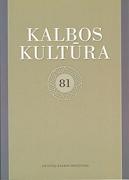Kitaip nepasakysi (metakalbiniai komentarai tekstuose)
You cannot say otherwise (metalinguistic comments in texts)
Author(s): Kazimieras ŽuperkaSubject(s): Language and Literature Studies
Published by: Lietuvių Kalbos Institutas
Keywords: Meta-linguistic comments; post-position
Summary/Abstract: In a large variety of meta-linguistic comments there is a distinct functional semantic type of comments where the addressor evaluates his/her expression (a word or a phrase) as important, relevant, most precisely worded and indispensable in the situation. Stereotypical meta-linguistic comments of the type include such phrases as kitaip nepasakysi / nepavadinsi; kitaip kaip (...) nepasakysi / nepavadinsi; kaip kitaip pasakysi / pavadinsi. The above comments most frequently occur in post-position, i.e. the commentary follows the language item which is treated as optimum, or the most precise. The final, post-positional, comment emphasises the preceding word or phrase; moreover, the comment can be treated as justification for a stronger expression or a slip of the tongue. The most frequent post-position of the comment presumably attests to the fact that the preceding words and phrases are created in a flow of speech and are definitely emotionally coloured; they are not instances of prefabricated language. In contemporary Lithuanian texts, comments of you cannot say otherwise type are four times less frequent in pre-position. They are usually used to signal a strategy of speaking: the addressee is warned beforehand that a stronger word is likely to be used. The meta-linguistic comments of the above type are used in the so-called free styles, mainly written publicist texts, in public and private spoken language. The data of ca. 700 meta-linguistic items has shown that comments of the above type are used with expressive evaluative expressions, usually with expressions referring to negative evaluation. In the corpus, the expressions referring to negative evaluation are 10 times more frequent than those referring to positive evaluation.
Journal: Bendrinė kalba (iki 2014 metų – Kalbos kultūra)
- Issue Year: 2008
- Issue No: 81
- Page Range: 141-150
- Page Count: 10
- Language: Lithuanian

